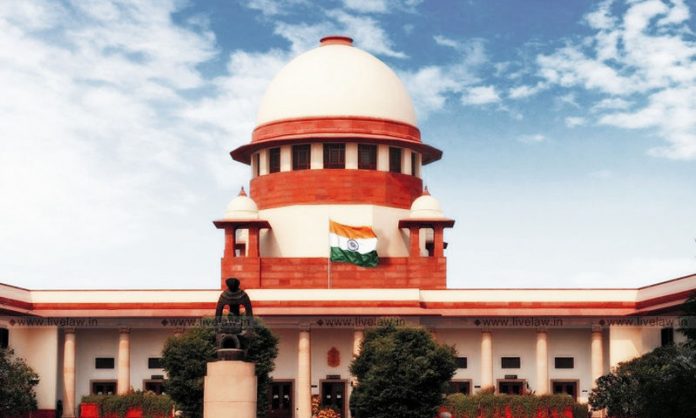This article is written by Priyanshi Soni, from Symbiosis Law School, Noida. This article seeks to explain the parameters which are followed by the Supreme Court in transfer petitions and landmark cases related to the same.
Table of Contents
Introduction
In the pandemic times, a number of transfer petitions have been filed in the Supreme Court. A transfer petition is a petition filed in the court seeking transfer of the case from state agencies to a central body or from one High Court to another or from High Court to Supreme Court. This is done usually to ensure a fair trial, ensure justice, avoid delay or inconvenience, etc.
Transfer petition under CPC
In civil cases, the provision of power of the Supreme Court to transfer the petitions is dealt with under Section 25 of the Code of Civil Procedure, 1908. It states that the Supreme Court can transfer the petition from a High Court or other Civil Court in one State to a High Court or other civil court in any other State. This can be done on an application by a party and after the SC being heard by such parties, can transfer the petition to make it convenient in achieving justice for the party if the court feels so.
If the court dismisses such a petition then it can order the applicant to pay a maximum sum of two thousand rupees to the opposer of application.
Divorce transfer petition in Supreme Court
In a divorce petition filed in the Supreme Court, the husband files a divorce petition in the state where he resides and the wife usually moves to her home/parent state. So in such cases, the wife moves for the transfer of such a petition on the grounds that she cannot afford to travel to that place where the petition is normally filed or she cannot leave her child behind, or that she faces threats when she goes to defend the proceedings. But the court does not always take a sympathetic view towards her as the court cannot always make the husband suffer. The husband can take a defence that if the wife claims to have a minor child then grandparents can be asked to look after the child and so merely based on having a minor the transfer petition cannot be granted to her (Anandita Das v. Sirjit Dey (2006)).
In Priti Sharma v. Manjeet Sharm (2005), it was held that a wife cannot merely give a reason for the threat to her for the transfer petition, she has to give proper proof for the same. In the case of a wife seeking transfer because she was unemployed and unable to commute, the Court stated unequivocally that “merely because the petitioner is a lady does not mean she cannot travel,” and the transfer petition was dismissed.
Statutory & constitutional provisions dealing with criminal transfer petition
Section 406 in the Code Of Criminal Procedure, 1973 deals with the power given to the Supreme Court to transfer the cases/petitions and appeals pending in one High Court to another High Court or from a criminal court subordinate to one High Court to another Criminal Court of equal or superior jurisdiction subordinate to another High Court so that the justice is being achieved for the party.
Subsection 2 mentions that there has to be an application made by the attorney or the party and after that only the SC will act upon the same. And, similar to what CPC says, If the court dismisses such a petition then it can order the applicant to pay a maximum sum of two thousand rupees to the opposer of the application.
Irrespective of whatever is mentioned under CPC and CrPC, there are a few provisions mentioned in the Constitution of India which provide for direct transfer of a case from one court to another so as to do complete justice for the citizen and uphold the citizen’s right to justice as given under Article 21 of the Indian Constitution. These provisions are –
- Article 32 – This is the Right to Constitutional Remedy whereby a person can move to the Supreme Court to enforce his/her rights. The SC issues writs to enforce any of the rights.
- Article 136 – This deals with the special leave to appeal by the Supreme Court in which the SC can allow special leave to appeal any judgment or decree passed by any of the court or tribunal.
- Article 142 – This Article allows the SC to do complete justice in any matter the Supreme Court derives overarching powers to perform the functions of Executive and legislative to bring about complete justice.
- Article 139A – This Article provides for the transfer of case by SC and transfer of the case from one High Court to another on the ground that it deals with the general question of law.
Test of transfer propounded by the Supreme Court
In Maneka Sanjay Gandhi v. Rani Jethmalani (1979), Justice Iyer considered the “first imperative” and “central criterion” to be there during a fair trial as a measure to decide for a motion of transfer. He also observed that to exercise the power of transfer, the party cannot simply do so for its convenience or easy availability of legal service. There has to be a substantial reason from the view of public justice. Also, it has been noticed that many frivolous petitions have been filed in this regard. “The safety of the person of an accused or complainant is an essential condition for participation in a trial and where that is put in peril by commotion, tumult or threat on account of pathological conditions prevalent in a particular venue, the request for a transfer may not be dismissed summarily.”
Similarly, in Nahar Singh Yadav vs. Union of India (2011) as well, few parameters were laid down to be followed by the court while allowing transfer petitions. It was stated that no precise rule could be established to regulate whether or not power under Section 406 should be exercised. The order cannot be passed merely on the apprehension of an unfair trial, but only when there is reasonable proof and it is necessary to provide credibility to the trial especially when dealing with national/international ramifications.
The factors to be kept in mind before ordering this should be –
- When it can be analyzed that the state machinery or prosecution is working hand in hand with the accused, and so there is a risk of a miscarriage of justice due to the prosecution’s irresponsible attitude.
- If the danger might be caused to the complainant by the accused or he might influence the witnesses and the inconvenience caused to them all.
- Also, the burden to be borne by the State Exchequer in making payment of official and non-official witnesses’ travel and other expenses.
- If there is a communally heated atmosphere, providing some evidence of inability to undertake a fair and impartial trial due to the charges levelled and the nature of the crime committed by the accused.
- Some concrete proofs showing that there will be a strong interference by some threatening people.
Cases where transfer petition was rejected
In many cases in recent years, the court rejected the transfer due to reasons such as unreasonable proof of apprehension of a trial getting disrupted, etc.
In R. Balakrishna Pillai vs. the State of Kerala (2000), it was contested that one of the Judges hearing the appeal had previously appeared as an advocate in a commission inquiring into an allegation of misconduct against the same petitioner in another matter but the petition for transfer was rejected as the Court said that the two matters are altogether different and also the advocates appear for various clients but that does not mean he will have any personal interest with the matter. This would also undermine the unbiased and stern nature of judges. Also, in a similar order given in Bhairu Ram vs. Central Bureau of Investigation (2010), the Court stated that mere inconvenience cannot be a solid ground for this but if it is shown that if the transfer petition is not granted then it might result in failure of justice, then it can be granted.
Similarly in Rajesh Talwar vs. CBI (2012), the Court again refused the transfer petition and also warned the petitioner to not make any unscrupulous remark to the court proceedings.
Cases where the transfer petition was granted
- In L.S. Raju vs. State of Mysore (1952), the transfer petition was granted by the Supreme Court on the ground that the petitioner was convicted on the charge of attempt to murder the High Court Chief Justice and so he asked to transfer the case to another HC as he possibly will not have a fair trial as the HC is presided over by the complainant itself.
- In Central Bureau of Investigation vs. R. Hopeson Ningshen (2010), due to the communal tension between the Meities and the Nagas and the actual possibility of fights and killing of several people, all the cases were transferred from Manipur to Delhi High Court. This was considered a legitimate reason for the transfer.
- In R.S. Sodhi Advocate vs. State of U.P. and Ors. (1994), some serious and genuine allegations were made on police officers that they killed several persons during encounters, and so on this basis, the investigation case was transferred from the police to CBI.
- In Mithilesh Kumar Singh vs. State of Rajasthan (2015), again, the investigation on the death of a female school due to ragging was passed to CBI as the college and police were coercing and the evidence was fabricated. The Court found it absolutely relevant as the case was sensitive.
- In a very recent and widely discussed case Rhea Chakraborty vs. State of Bihar & Ors. (2020), the Supreme Court allowed CBI investigation into the case so as to do complete justice and make people confident about the transparent and true investigation.
Conclusion
At present time, many instances of political scandals and interference and the coming of whistle-blowers are increasing. These cases require justice to be safely delivered and even the courts have time and again held that the main basis of transferring the petitions has been the fair delivery of justice to people. In such cases, mere apprehension of the wrong or danger is not enough. Properly substantiated reasoning must be given or inferred. In many instances, a far-fetched connection with some political party or Judge or any small past encounter makes people go asking for the transfer of petitions. But the court has rejected such pleas many times, as we saw in the article. The court takes into account various things while deciding if it should grant the transfer or not. Thus, not concrete rules can be laid down for this, it all depends and varies from case to case and circumstances.
References
- https://www.iilsindia.com/study-material/90222_1608480608.docx
- https://www.latestlaws.com/bare-acts/central-acts-rules/cpc-section-25-power-of-supreme-court-to-transfer-suits-etc-/
LawSikho has created a telegram group for exchanging legal knowledge, referrals, and various opportunities. You can click on this link and join:
 Serato DJ Crack 2025Serato DJ PRO Crack
Serato DJ Crack 2025Serato DJ PRO Crack











 Allow notifications
Allow notifications


